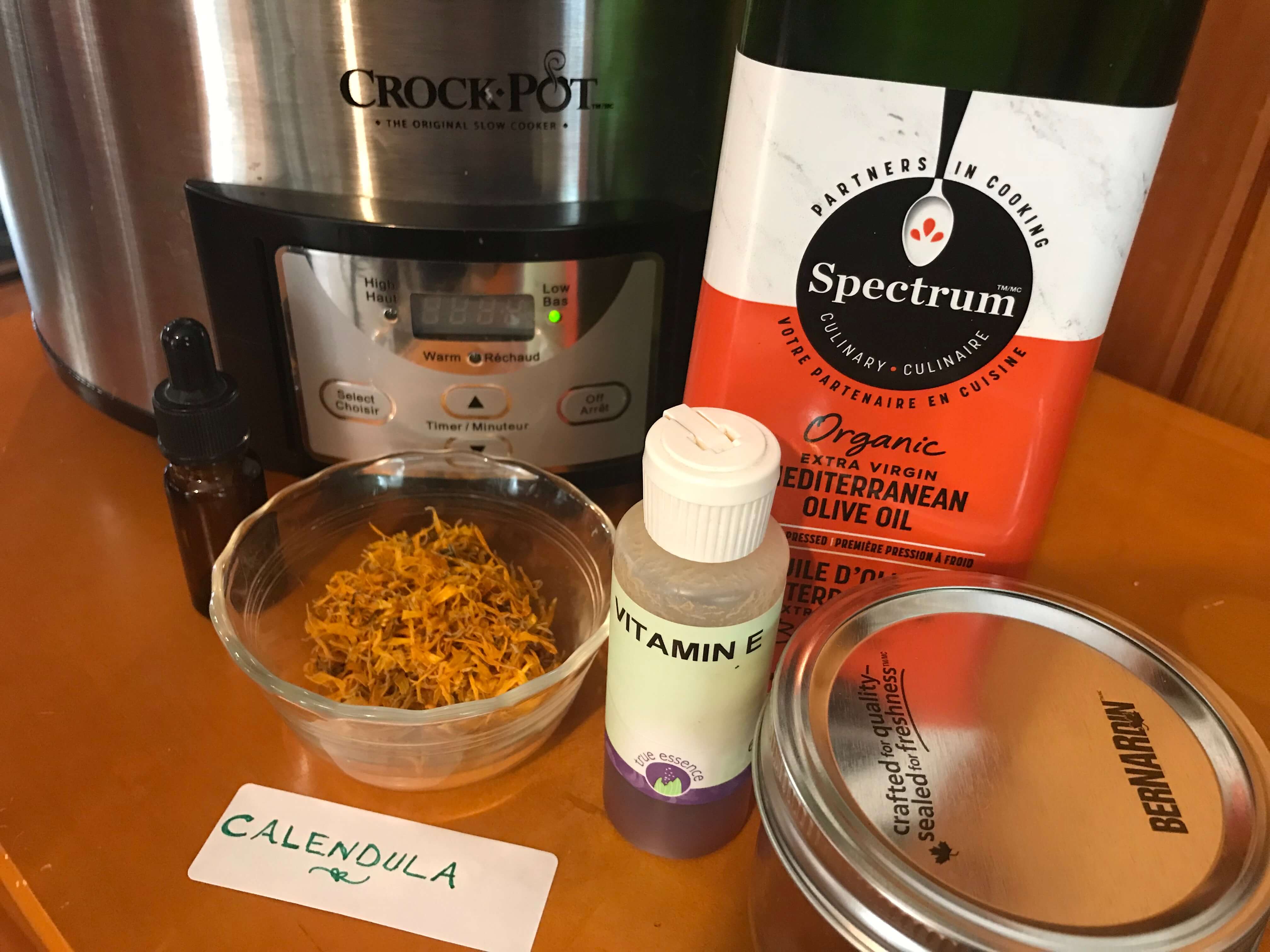Co-Creating Healing Oils
Let‘s reclaim the word ‘medicine’ by defining it as anything that helps us align with our inner truth. When we are in alignment with our truth we feel balanced, confident, grounded and radiant. When we walk our way, unconditional love for self and all of life prevails. Creativity and calmness thrive. Our plant relations offer guidance ~ physically, mentally, emotionally and spiritually ~ as we find our way back home to our true essence. What could be finer than treating yourself or your loved ones to a massage, immersing in a plant-infused bath after a stressful day or savoring a spoonful of healing oil when feeling ill? Healing oils are easy to make and can be used as the basis for creams, balms, and ointments. These land-based medicines can be made in your kitchen or outdoors with the help of the sun. Given it is winter as I write this post, here is a simple kitchen recipe using a crock-pot. A double boiler is another option.
TIPS: To co-create a beautiful healing oil, open your heart and be fully present, select high-quality ingredients and watch the cooking temperature (no higher than 38°C /100°F).
TIME: You can co-create your healing oil in as little as one hour or as long as 10 days. Medicinal strength increases with infusion time. If heating more than one day, stir or shake the mixture each day. Choose a time that fits with your schedule and the purpose of the infused oil.
INGREDIENTS:
Organic herbs of your choice. Grow, gather or buy healing plants. Please consider giving back to the land community by choosing species that are not at risk (see link below), never using pesticides and by supporting the protection of natural areas in your region. Using DRY HERBS is highly recommended as the water in the plants increases the chance of microbes spoiling the oil.
High-quality cooking oil Please choose organic oil if possible. Remember: If it’s on your skin, it’s going in! The oil is the carrier of the medicine. With skin contact and warmth, the oil softens the keratin of the skin facilitating absorption of the plant’s active ingredients. The oils themselves can be medicinal. For example, olive oil has many proven health benefits including prevention of heart disease, enhancing brain function, and reducing inflammation (such as rheumatoid arthritis). Additionally, olive oil is a highly stable oil meaning it will not spoil easily. Other commonly used oils include sunflower, jojoba, almond and grapeseed.
Vitamin E (Tocopherol). Vit. E is an antioxidant and therefore enhances the shelf-life of your oil infusion. Storage in a cool, dark place also reduces the chance of spoilage.
KITCHEN TOOLS:
- Crock-pot & kitchen towel
- Thermometer
- Clean (ideally sanitized in your dishwater), dry glass jars (ideally colored glass to reduce exposure to damaging UV light) and an airtight lid. Smaller containers are best to reduce the amount of air in the jar.
- Unbleached cheese cloth
- Stainless steel strainer
- Stir stick
7 EASY STEPS:
- Thoroughly wash and dry your hands and work in a clean, clear area. Give thanks to your chosen plants. Select only healthy plants growing in healthy communities. Chop finely or grind in a coffee grinder (used only for herbs).
- Add 3-4 tablespoons of dry herbs to your clean jar. Cover the herbs with oil, ensuring no plants are exposed to the air. A useful ratio to remember is 1/3 plant to 2/3 oil. Tend to your infusion by stirring and topping up the oil if needed. You may also wish to infuse the oil with your healing intentions.
- Place the jar on the towel in the bottom of your crock-pot. Keeping the lid off my crock-pot maintained the oil at the desired temperature. Experiment with your crock-pot to determine what works best. A double-boiler can also be used. Cook at a low temperature.
- Let the plant-oil mixture simmer for the desired time. Intuition, aroma and colour will indicate when the plant’s active ingredients have been extracted into the oil.
- Remove the jar. Once cooled enough to handle, strain out the plant material by pouring the infused oil through a cheese-cloth lined strainer into another clean jar. Be sure to squeeze out all the plant goodness from the cheese cloth. Return the plants and cheesecloth to the earth by composting. Give thanks.
- Add one drop of Vitamin E to the cooled oil.
- Clearly label your jar with the medicine’s name, ingredients (including type of preservative used), any precautions* and the expiry date (typically 6 months to 1 year if kept in a cool, dark place). Just as you would check the freshness of the cooking oils in your pantry, be sure to monitor the quality of your infused oil each time before using. Changes in original colour, rancid aroma and cloudy appearance signal it’s time to compost your infused oil.
ENJOY!
Sources of Information:
- Experience ~ time with land, practice, making mistakes, reflecting, trying again & success!
- Teachings from Gigi Stafne, Master Herbalist and Naturopath Doctor
- The Herbal Medicine-Makers Handbook: A Home Manual by James Green, Herbalist
- Rosemary Gladstar’s Medicinal Herbs: A Beginner’s Guide.
- healthline.com
- mommypotamus.com
- unitedplantsavers.org
*IMPORTANT Our plant relations are generous and hold great power. Please do not assume if something is natural it is harmless. When introducing yourself to a new plant relation be respectful by taking your time, doing your research, and testing a small amount to determine your body’s compatibility. Be sure to label and safely store all your herbal products.
SPECIES AT RISK https://unitedplantsavers.org/species-at-risk/

